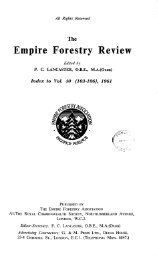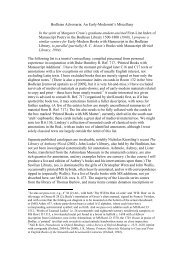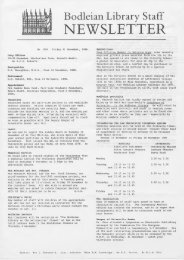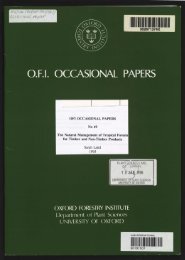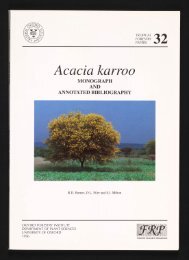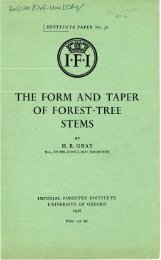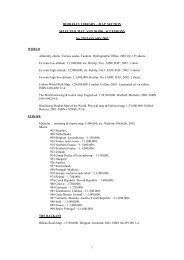Commonwealth Forestry Review
Commonwealth Forestry Review
Commonwealth Forestry Review
You also want an ePaper? Increase the reach of your titles
YUMPU automatically turns print PDFs into web optimized ePapers that Google loves.
c. E. LANE-POOLE<br />
CHARLES EDWARD LANE-POOLE first came to Australia in 1916 and for the next thirty<br />
years zealously applied his great talents to the advancement offorestry in that country,<br />
first on a State, and later on a Federal level.<br />
Arriving at a time when Australian forestry was still regarded in many quarters as<br />
little more than a mining operation, Lane-Poole played a prominent role in the fornlulation<br />
and acceptance of sound forest policies on which are based many of the<br />
great developments that have taken place since his retirement from official forestry<br />
in 1945.<br />
Although his n10st enduring contributions probably lie in the areas of forest policy<br />
and forestry education, Lane-Paole excelled in many other fields including the exploration<br />
and classification of tropical forests in Africa and New Guinea. He was an<br />
unconlmonly tough character whose non-appeasing attitudes to principles in which<br />
he believed at times brought him into sharp conflict with higher authority. Inevitably<br />
he suffered severe setbacks, but he never abandoned the goals he had set himself,<br />
and which in the end he generally achieved.<br />
Born in Sussex, England, in 1885, Lane-Paole received his early education in<br />
Dublin and his forestry training at the French <strong>Forestry</strong> School at Nancy. He went to<br />
South Africa in 1906 and after a year at the South African Forest School served until<br />
1910 as District Forest Officer in the Transvaal. He was then appointed Conservator<br />
of Forests, Sierra Leone, where he renlained until 1916, when he accepted the post of<br />
Conservator of Forests, Western Australia.<br />
In Africa he carried out extensive forest surveys and whilst engaged on this work was<br />
able to indulge his taste for living dangerously. He acquired a reputation for swimnling<br />
crocodile infested rivers, embarking on lone lion hunting expeditions, and capturing<br />
deadly tropical snakes alive. In the latter task he used to good effect the steel hook<br />
that served as a replacenlent for his nlissing left hand. In spite of his single hand he<br />
conducted all his surveys in Africa, and later in New Guinea, alone or with native<br />
bearers, and was very skilful in handling conlplicated survey and other field equipnlent.<br />
He was also an exoert horsenlan.<br />
Lane-Poole was recolnnlended for the position of Conservator of Forests in Western<br />
Australia by Sir David Hutchins who at that tinle occupied a senior forestry post in the<br />
Union of South Africa, and who had been invited to report on forestry 111atters, first<br />
in Western Australia and later in Australia as a ,vhole. Upon taking up his new position,<br />
Lane-Poole, with characteristic vigour, set about re-organising the functions of the<br />
f"orestry Department. One of his early achievements was the fashioning of the <strong>Forestry</strong><br />
Act, 1918, which gave that State the basis for a sound forest policy and provided for the<br />
dedication of State forests in perpetuity. This Act was to serve as a model for other<br />
States and still stands as a monument to his foresight and ability. He also itnplenlented<br />
a vigorous forest asseSSlnent and classification programme that soon revealed<br />
that fornler estitnates had grossly exaggerated the extent of the State's forest resources,<br />
thus giving even greater urgency to the need for the retention and proper Inanagement<br />
of those areas remaining.<br />
Deeply concerned with the lack of trained staff, he established a school for forest<br />
forenlan and rangers in Western Australia, and in collaboration with foresters in<br />
other States, campaigned vigorously for a National <strong>Forestry</strong> School to provide the<br />
highly trained professional staff of which Australia was desperately short. These<br />
latter endeavours were later to bear fruit with the establishment of the Australian<br />
<strong>Forestry</strong> School.<br />
In 1921, Lane-Poole found himself at odds with the Governtnent of the day over<br />
its decision, taken against his advice, to extend concessions and leases held by a large<br />
private tilnber concern, and rather than implement what he considered to be an<br />
incorrect policy, he tendered his resignation. In view of his already considerable<br />
achievements and his high aspirations for the future of forestry in Western Australia,<br />
1



